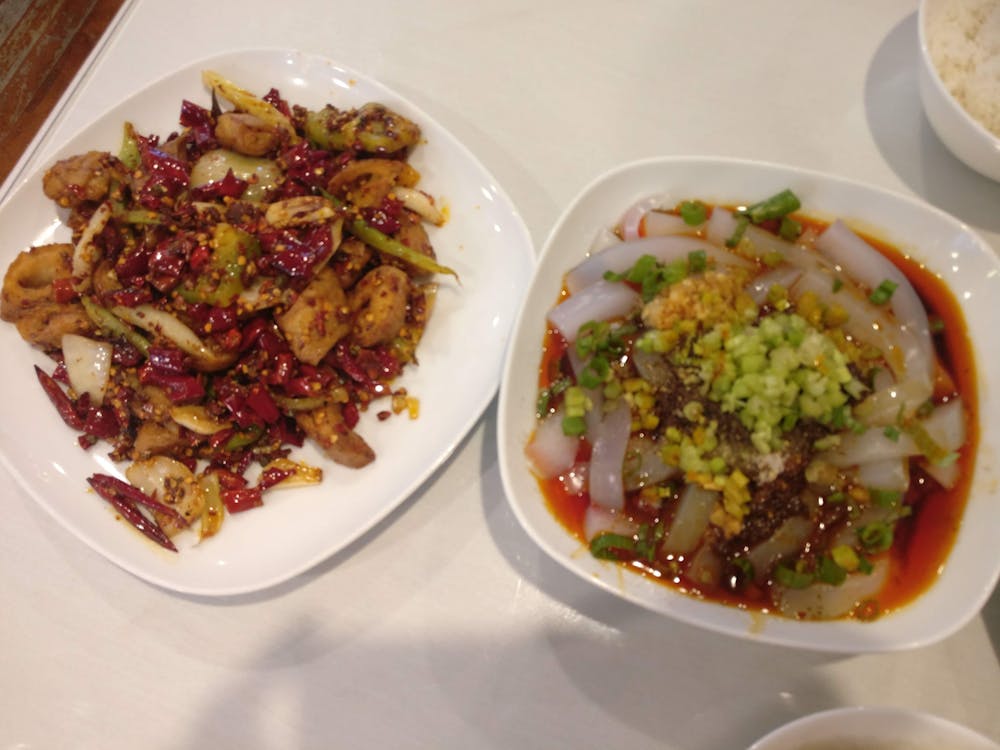In this issue of The News-Letter, Your Weekend brings you a special theme: Taste of Home. In the other article, you will hear from Aubin, who has found a warm comfort in the homey stews and fried plantains from the newly opened Sobeachy Haitian Cuisine in the renovated Cross Street Market.
I, on the other hand, will revisit one of the places I have loved to hate in the two-and-a-half years of my Hopkins undergraduate career: Orient Express. It’s that restaurant on St. Paul Street with the red lanterns hanging on the outside, with order-at-the-counter style dining.
Orient Express is the place to go for anyone craving a bite of true-to-form Sichuanese food. That being said, let’s start with the braised dishes. They’re awful. The beef noodle soup, a dish with colorful renditions varying from region to region in China, is done in a disappointing manner.
The beef used is cheap; it is dry as you bite into it, and the flavorless chunk of meat goes down with a hard swallow. The carrots are boiled to mush, and the entire soup is served with noodles that have a similar sludgy texture. The soup’s mild beefy flavor is carried mostly by the enhancers added, and the whole dish is nothing like the beef noodle soup I had in China with my grandparents.
The various stir-fries and appetizers are executed quite well, albeit they are slightly inconsistent. For instance, I went with a friend on a Saturday evening and we ordered the dry wok pork intestine (gan bian fei chang). Despite my doubts, the dish was delicious. The intestine was thoroughly washed with no off flavors, sliced thin and mixed with starch for a crispy exterior. The entire dish was perfumed with Sichuan peppercorn, chopped dried peppers, garlic, ginger and scallion oil.
A few weeks later, I visited for a Thursday lunch. I ordered the same fried pork intestine dish. It had all the same ingredients, but the intestine was thick. It retained much of the oil from the deep-fry. When I bit into it, my teeth squeezed out oil from the soft sponge, and it coated the inside of my mouth in an unpleasant grease bomb. Due to the larger size of the cut and the improper ratios of the ingredients, the dish was a ghost of what it was when I had it the first time. The bright and bold flavors of the first time were dulled by the soft flavorless fat of the interior. The salt and MSG on the outside missed the enhancement of the powerful flavors in between.
The same could be said about the chicken with Sichuan peppercorn (la zi ji). When ordered on a busy night, it can be the perfect crisp. The dish is done in a similar dry wok manner as the pork intestine. You pick between all the chilies and spices to eat the delectable little bites of deep-fried chicken, and it’s even better with rice.
But sometimes, the chicken may have come into contact with too much water in some form, whether it be soy sauce, steam or Shaoxing wine. The chicken will still be delicious, but it will have lost the crunchy exterior that makes it worth ordering. The mapo tofu is prepared without the traditional ground pork bits to contribute to the dish. The doubanjiang, or spicy chili broad bean paste, is not chopped prior to incorporation, leaving papery pieces of pepper skin to stick to the roof of your mouth. Fortunately, despite the lack of pork, the flavor is superb due to the intense aroma of the scallion oil that makes up part of the oily sauce.
The recent renovations have brought glossy new wooden chairs with matching tables and jade-green tiles to match the tastes of the international students and professors that frequent the place the most. I believe it is the same people who you see wearing Supreme shirts and Gucci belts that will most often come for the as-authentic-as-you-can-get Chinese food.
The other side exists as well; people will come for the sauced up American Chinese classics, but those are not interesting enough to warrant full discussion when it comes to this restaurant. Of course, Orient serves those dishes; it’s a restaurant trying to balance the books in Baltimore.
What makes my relationship with Orient Express one of love-hate is not the food, though. It is the people. I have on numerous occasions attempted to order with my rusty Chinese, and the person at the front will tell me to just use English, letting out a sigh of disdain at the disappointment to my origins I have become. This is one of the only places on Earth where I will be shamed for not knowing my Chinese.
When I visit my relatives in China, I always feel self-conscious about my broken Mandarin: as if I am not enough. It is just a stressor that pulls me in yet another direction in a life where I feel like I can always do more. But the difference is when my grandparents greet me, they are just glad that I can understand them and that I visited (albeit there is that one asshole uncle who always points to my lack of skill with a wide passive-aggressive smile on his face). When the guy at Orient Express greets me (if you can even call it that), it is a painful reminder of the disappointment to the motherland I have become.
TL;DR: Every time I go to Orient Express, I eat familiar, delicious foods while stewing in my insecurity in my distance from my heritage.





